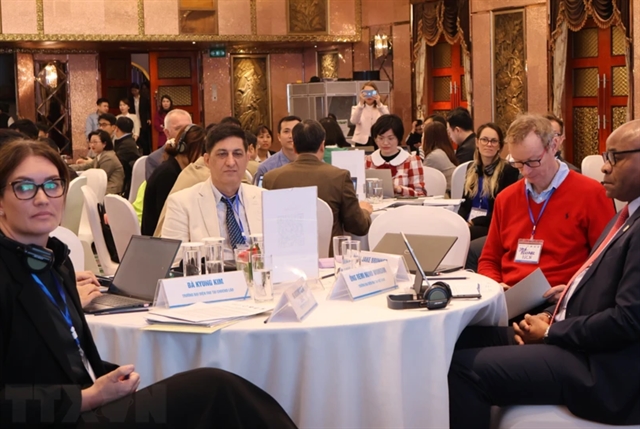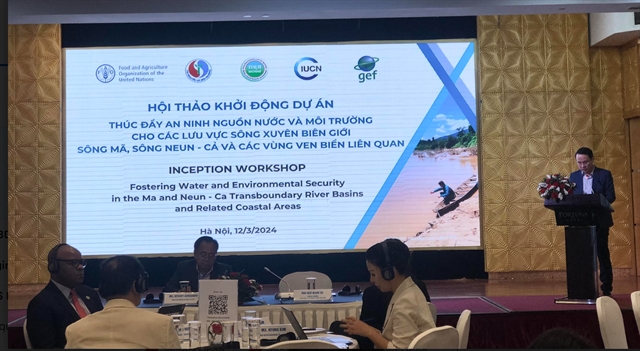 Environment
Environment

 |
| Participants at the workshop themed “Fostering Water and Environmental Security in the Ma and Neun-Ca Transboundary River Basins and Related Coastal Areas, Việt Nam and Lao PDR”. VNA/VNS Photo |
HÀ NỘI The environment ministries of Việt Nam and Laos on Tuesday held a workshop to launch a bilateral project on water and environment security in the Mã and Neun-Cả rivers.
The project, themed “Fostering Water and Environmental Security in the Ma and Neun-Cả Transboundary River Basins and Related Coastal Areas, Việt Nam and Lao PDR”, aims to strengthen integrated water resources management and "ecosystems health" in the Neun-Cả and Mã river basins.
It is a result of collaboration between Việt Nam's Department of Water Resources Management (DWRM) under the Ministry of Natural Resources and Environment (MoNRE) with the Food and Agriculture Organisation (FAO), the Department of Water Resources (DWR) under the Ministry of Natural Resources and Environment in Lao DPR, and the International Union for Conservation of Nature (IUCN).
The workshop, which introduced the project and captured feedback on the project design and implementation plan, brought together many central and provincial government officials from Việt Nam and Lao DPR, local and international NGOs, universities, research institutes and other stakeholders.
This five-year project has a budget of US$8 million funded by the Global Environment Fund (GEF) of which about $3 million will be channelled to support pilot project implementation in the Mã and Neun-Cả basins.
Its overall goal is to enable Việt Nam and Lao PDR to address freshwater resource management and ecosystem health in the transboundary Mã and Neun-Cả river basins and coastal zones by creating an enabling environment for transboundary cooperation and action.
IUCN is the lead operational partner responsible for project coordination and technical oversight.
In opening remarks at the workshop, Rémi Nono Womdim, FAO Representative in Việt Nam, said: "Importantly, as the first bilateral GEF international waters project between the two countries, it will address the common challenges that the Mã and Neun-Cả rivers share."
“The project's efforts to enhance water and environmental security in the Mã and Neun-Cả river basins align closely with FAO's 2022-2031 Strategic Framework, advancing the 'four betters': better production, better nutrition, better environment, and better life. By creating the enabling conditions for transboundary cooperation and action on shared water resources, the project contributes to healthier ecosystems, which are foundational to sustainable agrifood systems, improved livelihoods, and a better future for communities in Việt Nam and Lao PDR,” according to the FAO official.
Sharing the same view at the workshop yesterday in Hà Nội, Ngô Mạnh Hà, Deputy General Director of DWRM of Việt Nam's MoNRE, and Dr. Inthavy Akkharath, Director General of DWR, Lao DPR's MoNRE, said: “The project is consistent with national priorities and the ambitions of the new law on water resources management. Both governments strongly support this project and will work closely with IUCN, FAO and other partners in Việt Nam and Lao PDR to address climate change impacts and improve natural resources management in both river basins.”
 |
| Ngô Mạnh Hà, Deputy General Director of DWRM of Việt Nam's MoNRE makes his speech highlighting the importance of the Việt Nam-Laos project on water and environment security in the Mã and Neun-Ca rivers. VNS Photo Mai Khuyên |
The project will be implemented with five expected outcomes including: 1) getting consensus among countries on key transboundary concerns; 2) enhancing water security, environmental sustainability and forecasting capabilities in both basins and their coastal areas; 3) reinforcing joint actions; 4) reversing land degradation trends in the two basins; and 5) enhancing the capacities of relevant national entities, and sharing project experiences and lesson learnt.
Jake Brunner, Head of IUCN Lower Mekong Sub-region and IUCN Việt Nam Country Representative, emphasised: “As the lead executing agency, IUCN will collaborate with a wide range of partners on project implementation. This includes setting up a transboundary coordination mechanism to collaboratively manage surface and groundwater. This will maximise the economic value of the basins’ water resources and reduce risks of floods, droughts and saline intrusion.”
Participating the workshop, representatives from across sectors contributed ideas, and provided inputs and comments for project implementation and future plans to promote transboundary cooperation, build sound river basin management frameworks, and strengthen water and environmental security and gender equality.
Việt Nam and Lao PDR share several transboundary waterbodies which play a crucial role in supporting the livelihoods of millions of people, sustaining ecosystems, and driving economic development, experts said.
However, the experts have also warned these waterbodies face increasing pressures from population growth, urbanisation and climate change, highlighting the urgent need for effective and sustainable transboundary management.
The challenges are immense and further complicated by multiple pressures on water resources at the water-energy-food-ecosystem nexus. VNS




